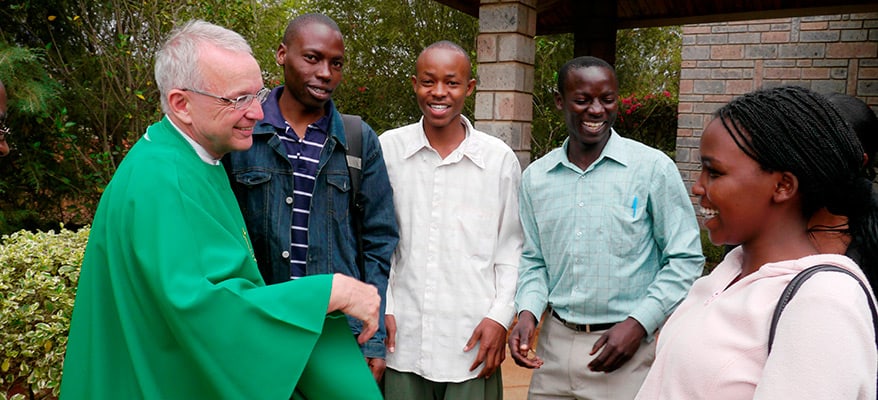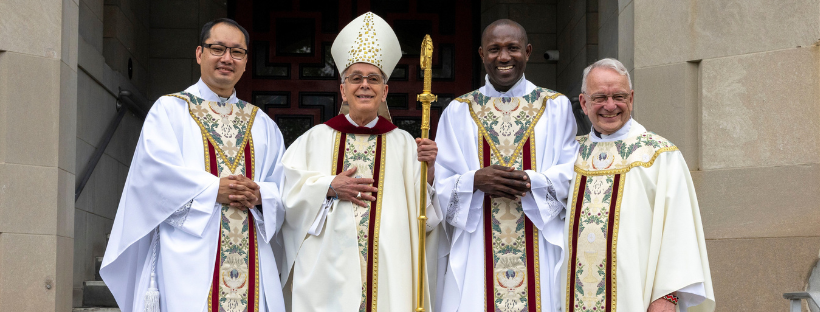Today is the second-to-last Sunday of the Church’s liturgical year. Next Sunday we celebrate the Feast of Christ the King; then we begin the season of Advent. Our readings today, especially from the prophet Malachi and the evangelist Luke, are not easily understood. They are a type of writing known as “apocalyptic literature.”
The readings capture our attention through a variety of images. The prophet Malachi writes that “the day is coming, blazing like an oven” and it will set all evildoers on fire. Jesus says that “the days will come when there will not be left a stone upon another stone that will not be thrown down.” These dramatic images are not meant to overwhelm us with fear. Rather, they are a clarion call to profound faith in God.
Living in Turbulent Times. If we are honest, we must admit that we do live in uncertain times. There is the ongoing war in Ukraine. Recent typhoons and hurricanes have brought unbelievable destruction. I recall the consoling words of the Philippine bishops during a time of national unrest in 2018; they wrote: “we are often so easily overcome by fear and panic…. There is nothing that can calm us down in these turbulent times, except the quiet recognition of Him who assured us of His abiding presence: ‘Be not afraid; it is I’” (Mt 14:27).
Interpreting Life’s Events. In his apostolic exhortation, Evangelii Gaudium, Pope Francis exhorts us to an “ever watchful scrutiny of the signs of the times” (EG 51). This task of examining current realities in the light of Christian faith is “a grave responsibility” (EG 51). Francis proposes using “an evangelical discernment” which is “the approach of a missionary disciple” who is guided by “the light and strength of the Holy Spirit” (EG 50). Christian faith demands “recognizing and discerning spirits” and ultimately “choosing movements of the spirit of good and rejecting those of the spirit of evil” (EG 51).
“Signs of the Times” Approach. This Christian approach to “faith-reflection” on current realities was promoted by the Second Vatican Council. In its document Gaudium et Spes, we read: “The Church has always had the duty of scrutinizing the signs of the times and of interpreting them in the light of the Gospel” (GS 4). We are to give a “faith-reading” to life’s events, engaging in “the theological interpretation of contemporary history.” All Catholics are to respond to the signs of the times. This “social engagement” is essential to the Church’s evangelizing mission in the contemporary world.
Following Pope Francis. Our Pope is deeply involved in a “faith-reading” of the signs of the times. He asks us to examine the many challenges present in today’s world. “Let us look upon them as challenges which can help us to grow” (EG 84). “Challenges exist to be overcome! Let us be realists, but without losing our joy, our boldness and our hope-filled commitment” (EG 109).
James H. Kroeger, M.M.
33rd Sunday in Ordinary Time
Lord of all times and seasons,
You Who are the Alpha and the Omega
the Beginning and the End of all time,
space, things visible and invisible,
send forth your Spirit of wisdom
and understanding that I might
read the signs of the times aright.
You, for whom a thousand years
pass like a single night and
a single day passes like
a thousand years, may we look
at this passing world and realize
all things pass away but
you alone last forever.
In these uncertain times and confusing
events, let my faith in you never waiver.
You Who alone are the still point in
an ever-changing world, grant that
I put my faith in you alone and trust
in your promise to remain ever
at my side till the end of time,
amen and come quickly, Lord Jesus.
Amen.
By Fr. Joseph Veneroso. M.M.




